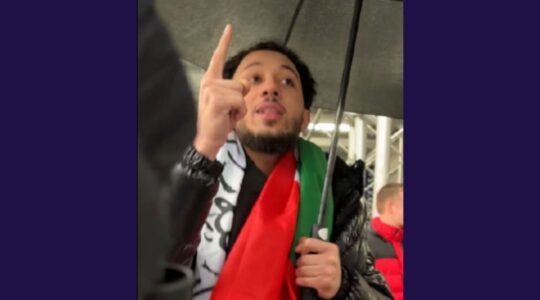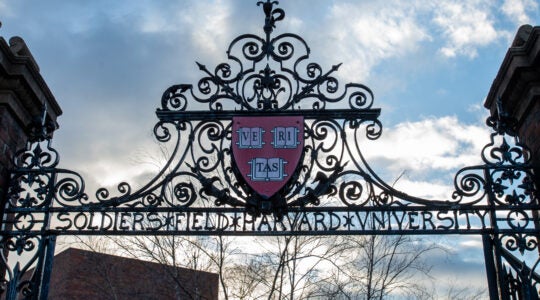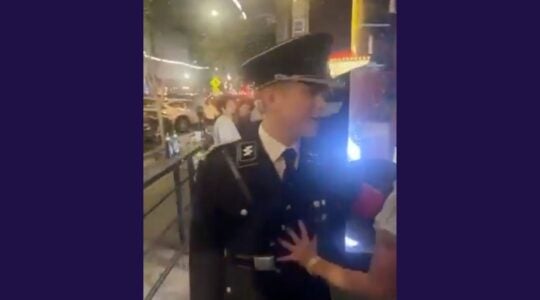
Tom Pessah (Sue Fishkoff)

Jacob Lewis (Photo by Matthew White)

Simone Zimmerman, center, speaking at the J Street conference in Washington on a panel titled “Who’s Afraid of BDS,” Feb. 28, 2011. Pictured are, left to right, Ken Bob of Ameinu, Hebrew University Professor Bernard Avishai, Zimmerman, Rebecca Vilkomerson of Jewish Voice for Peace and moderator Kathleen Peratis. (J Street)
BERKELEY, Calif. (JTA) — It’s March, which means the days get longer and the Israeli-Palestinian conflict heats up on campuses across North America with the annual staging of Israel Apartheid Week.
Last year, pro-Israel activists countered Apartheid Week events ranging from anti-Israel speeches to the staging of mock Israeli army checkpoints with pro-Israel events on 28 campuses highlighting Israel’s diversity and progressive character. This year, more campuses are expected to join in.
One of the most politically active campuses in the nation has been the University of California, Berkeley. Last year it was the scene of a protracted debate over an anti-Israeli divestment bill that tore apart an already fractured campus community and left many students shaken, others angry and still others too exhausted to care anymore.
In recent days, JTA spoke to four Jewish student activists at Berkeley about what motivates them on Israel-related issues. The students span the political and religious spectrum, from an ardent Zionist to a supporter of the Boycott, Divestment and Sanctions (BDS) campaign, from Orthodox to secular. They all have strong Jewish backgrounds — three are day school graduates, and the fourth is an Israeli army veteran.
Here are their stories:
Jacob Lewis, leader of Zionist student group
While 100 people chatted noisily in the crowded room at Berkeley where Arab affairs expert Mordechai Kedar of Bar-Ilan University was about to start his lecture, Jacob Lewis was off in the hallway quietly unfolding more chairs for latecomers.
That’s his style. The 20-year-old sophomore isn’t the firebrand one might expect of the president of Tikvah, an avowedly Zionist student group that broke away from Hillel three years ago because its founders thought the established Jewish student organization on campus wasn’t pro-Israel enough.
“We’re the Zionist voice at UC Berkeley,” Lewis says firmly. “We advocate for Zionism as the national movement for self-determination of the Jewish people in their homeland, Israel. We were founded because no one else on campus was making that argument. No one was standing up to the rhetoric.”
Tikvah brings pro-Israel speakers to campus. Its activists distribute leaflets next to Israel Apartheid Week events and spearhead letter-writing campaigns to protest anti-Semitism. But they also present the diversity of Israeli culture and society by hosting events like a recent demonstration of Krav Maga, a form of self-defense developed in Israel.
The point, Lewis explains, isn’t that Israel is all good, but that it’s not all bad either.
That’s his main beef not only with Israel’s detractors on campus, like the Apartheid Week activists, but also with Hillel-affiliated groups, like the one that brought to campus speakers from Breaking the Silence, a group of Israeli army veterans who oppose Israel’s occupation of Gaza and the West Bank. Lewis said they “nitpicked details” of a very complex situation, and thereby generated anti-Israel and anti-Jewish hostility instead of thoughtful conversation.
“They make the delegitimization of Israel on campus much more legitimate because they’re seen as a mainstream group, part of Hillel,” Lewis charges of the group that brought Breaking the Silence to campus.
On the other hand, Lewis is wary of right-wing Jewish community members who spew anti-Islamic hatred at meetings attended by Tikvah students. He doesn’t want them controlling the Israel dialogue on campus either.
“We don’t believe Islam is the cause of our problems,” he says.
Referring to the adults from the larger community, Lewis adds, “When people come and talk about ‘what all the Arabs want’ or ‘this is what Islam says,’ that’s difficult for us to deal with.
“We walk a very fine line,” he acknowledges. “Different elements from the community want us to do different things. But we’re 100 percent a student organization. We don’t really care what other people think we should do. We know what we need to do.”
Tikvah exists only at Berkeley, Lewis notes.
“Berkeley is an absolutely crazy place,” he says. “The rhetoric is much more venomous. The campus is much more sympathetic to a leftist worldview. And we don’t get the same support from the Jewish community that you might get on other campuses.”
Yet Lewis chose to attend Berkeley after 12 years of Modern Orthodox day school in Chicago precisely because of the Bay Area’s diversity.
“In high school I was surrounded by people who believed like I did, but I was usually to the left of my friends,” he says. “Then I got to Berkeley and I got involved with Tikvah right away. I feel like I’m wrong no matter where I am.”
Noah Stern, student body president active in Hillel
Noah Stern has many demands on his time. The 21-year-old senior is an active member of Hillel, a fraternity brother at Delta Chi — and president of the student body. Plus he tries to squeeze in a little skiing.
Stern is the third Hillel activist in 10 years to be elected student president.
“We’re all Jewish guys from Los Angeles, and all in the same frat,” he says.
As president, Stern must navigate between his responsibilities to the entire student body and his personal Jewish convictions. It was easier last year, he says, when as a student senator he could represent his own constituents during the acrimonious debate over an Israel divestment bill.
Stern voted against the bill and went on to co-author a substitute resolution that did not single out Israel. The first bill passed but was vetoed by his predecessor; the second was voted down.
Now as president, Stern is happy the issue hasn’t resurfaced this year.
“My feeling is there’s acknowledgment that perhaps the [student assembly] is not the most appropriate venue for international politics,” he says.
Stern has a fine pedigree for a student activist: His father is a Reform rabbi, his mother works for the Jewish Federations of North America, and he attended Jewish day schools and Jewish summer camp throughout his childhood. He spent a year after high school in Israel with Kivunim, a Jewish program that encourages multicultural literacy and understanding.
In the same vein, last year he and a Muslim student co-founded Breaking Bread, an organization that sponsors coexistence dinner discussions on campus. The Jewish-Muslim dinner last December focused on cultural and religious similarities rather than the Israeli-Palestinian conflict.
“I won’t pretend it solved the conflict, but this is how I prefer to engage with the issue,” Stern says. “In general I’m not a protester. It presents a black-and-white position on issues that are very gray.”
As student president, even if he liked holding signs on Sproul Plaza, the arena of choice for Berkeley protesters since the early 1960s, he would be enjoined from lending his voice to a particular cause.
Israel Apartheid Week doesn’t stress him out, and he’s equally sanguine about Jewish students who protest Apartheid Week events.
“These are students that believe adamantly in their causes and are visible about it,” Stern says. “That’s how we do it here. Israel Apartheid Week, Israeli Peace and Diversity Week — it’s the Berkeley way.”
For his own part, he is way too savvy to speak, or act, off the cuff.
Asked about Peter Beinart’s New York Review of Books essay, which raised establishment hackles by suggesting that young Jews don’t have the same attachment to Israel and the Jewish community as their elders, Stern says Beinart was right on.
“I don’t think the adult Jewish community is as in tune with Jewish college students as they sometimes think,” he says, measuring his words carefully. “Strategies that might have worked in the past don’t necessarily meet the needs of today’s students.”
Not all Jewish students care about Israel, Stern says, nor should they be forced to. Those who do care don’t always agree, and that’s fine, too.
“The fact that different Jewish groups with difference stances on Israel exist on campus shows there’s a need,” he says.
Simone Zimmerman, J Street U member
Simone Zimmerman, a sophomore, spoke Feb. 28 at the J Street conference in Washington about the Boycott, Divestment and Sanctions movement on her campus.
“I recognize that BDS seeks to address serious human rights issues in Israel and the territories,” said Zimmerman, 20, a Middle East Studies major. But at Berkeley, she said, rather than creating discussion, “it created a polarizing atmosphere where both sides sank further into the extremes of their positions.”
She also said “It fostered animosity, squashed nuance and alienated the rational voices most essential to addressing these complex issues.”
Zimmerman was “really nervous” about giving her speech, she told JTA two days later. It didn’t help that minutes before her session, BDS supporters began tweeting each other to flood the room.
“My session was the only one with security outside,” she noted.
It was frustration with both pro-Israel and pro-Palestinian groups at Berkeley that led Zimmerman to join forces with J Street U, the organization’s campus arm. She said it was there that she found the “rational voices” she sought.
Zimmerman grew up in a Conservative home in Los Angeles and is an alumna of Jewish day school, Camp Ramah and United Synagogue Youth, the Conservative youth movement. She’s spent a lot of time in Israel, including a three-month exchange program in the 10th grade.
When she arrived at Berkeley, Zimmerman said she “fell in love with the atmosphere, the excitement I felt on campus.” She chose the school for that diversity and energy, but also because it was one of the only campuses where students told her they loved coming to Hillel. That was important to her.
But last year, her first on campus, ended with a vitriolic battle over the student government’s divestment bill. The hostility and intolerance she witnessed on both sides of the debate scared and saddened her.
“I saw a big hole in the conversation the community was having on Israel,” she says. “There’s a really divided scene here, very polarized. Students in the middle are exhausted, and the extremes get more extreme.”
Ironically, she learned about J Street through criticism of the group as anti-Israel.
“Then, when J Street opposed the divestment bill, I thought, that’s interesting — that’s not what I’d heard about them,” Zimmerman recalls.
Zimmerman is a consensus builder, not a placard waver. In addition to J Street U, she is chair of her Hillel’s Israel Action Committee, which she says was drained of its most active members when Tikvah siphoned off the most ardent Zionists and Kesher Enoshi: Progressives for Activism in Israel grabbed from the left.
“Our main goal is to educate, not advocate,” she says. “We’re not giving people fact sheets or telling them how to respond in 10 steps. We’re trying to teach people about a more nuanced, complex Israel.”
Zimmerman sees J Street as providing a middle ground in that conversation, although some of her closest friends don’t get it. When she called a friend in Washington to say she was speaking at J Street’s conference, the friend said, “Why would you be there?”
“People who are in the middle and who would appreciate what J Street is trying to do have been scared away by the establishment,” she says. “It’s been demonized.”
As for Israel Apartheid Week and its counterpart, Israeli Peace and Diversity Week, Zimmerman says, “I hate this week.”
Tom Pessah, Israeli active in Students for Justice in Palestine
Tom Pessah bristles when he hears people refer to “the Israelis” or “the Jewish community.”
“There’s no such thing,” he asserts. “I don’t feel I represent all Israelis or all Jewish students.”
Many Israelis and many Jews would agree.
Pessah, a Tel Aviv native, Israeli army veteran and 37-year-old doctoral student in sociology, is active in Students for Justice in Palestine, which advocates for Palestinian independence and supports the BDS movement. Students for Justice in Palestine was founded in 2001 at Berkeley, where it is a main organizer of Israel Apartheid Week, and the organization has since spread to other schools.
Like other Jewish students interviewed by JTA, Pessah says his main interest is opening the conversation about Israel and allowing all sides to be heard. Also like others, he sees his own organization as the champion of dialogue and other groups out to obstruct it.
Last year he went to his first Shabbat dinner at the Berkeley Hillel. The following week, he says, a pro-Israel student asked him not to show up anymore and to pass on the request to his fellow activists from Students for Justice in Palestine.
“He said, ‘It makes me uncomfortable because the Jewish community perceives you as anti-Semitic.’ He was smiling, as if I have to accommodate his feelings,” Pessah says, with some astonishment.
He hasn’t been back to Hillel since, and neither have his friends from Students for Justice in Palestine.
“A lot of us feel unwelcome,” Pessah says.
That said, he acknowledges that relations with Hillel, and even with the Zionist student group Tikvah, are better than they were two years ago. Tikvah’s founders, whom he describes as “very aggressive,” have graduated, and the directorship of Hillel has changed.
Pessah says he’s proud to be Jewish. Although he feels many Jews exaggerate the extent of anti-Semitism, he says it’s important to speak out when it surfaces.
Three years ago, Students for Justice in Palestine was blamed when a Star of David on campus was defaced with a swastika.
“We did not do that,” he insists. “We would never do such a thing.”
In fact, Pessah is able to use his leftist credentials to prevent anti-Semitic speakers from coming to campus. On two occasions, he says, the Muslim Student Association asked his group to co-sponsor speakers whom Pessah discovered had made anti-Jewish statements in the past. When his organization communicated that to the Muslim students, they canceled the speakers.
“They take us seriously because they know we wouldn’t use the term ‘anti-Semitic’ ” lightly, he says.
Pessah says he has not turned his back on Israel; quite the contrary: He plans on going back after receiving his doctorate. That’s why he’s active politically.
“I do this to make it a better country,” he says. “A comfortable life for Jews in Israel is dependent on a comfortable life for Palestinians.”
Once, while he was demonstrating for Palestinian rights, an Arab student approached him and said that seeing Pessah standing there made him realize his parents were wrong, that not all Jews were alike.
“That’s so important,” Pessah says. “It encouraged me to go to more protests. By building up this solidarity, we stop seeing each other in stereotypical terms. That’s my niche. That’s what I’m about.”
JTA has documented Jewish history in real-time for over a century. Keep our journalism strong by joining us in supporting independent, award-winning reporting.





